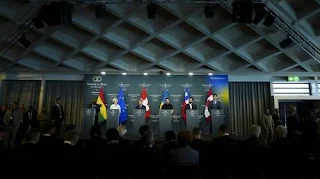The Swiss Ministry of Foreign Affairs confirmed in a statement on Sunday evening that the final number of signatories to the final statement of the Ukraine Conference had decreased to 82 countries and organizations.
The RT correspondent reported that she had obtained private information confirming that Jordan and Iraq had withdrawn their signature.
The summit, which was held in a resort in the Swiss Alps, was attended by more than 90 countries, as well as international organizations and bodies.
Earlier, Reuters reported that 11 countries participating in the Swiss conference on Ukraine refused to sign the final statement of the conference, which ended on Sunday.
The list of those abstaining from signing the statement included: Armenia, Bahrain, Brazil, India, Indonesia, Libya, Mexico, Saudi Arabia, South Africa, Thailand, and the United Arab Emirates.
Reuters noted that "a number of countries have complaints about the wording of the final statement."
The statement included the following basic points:
- Release all prisoners of war captured during the conflict in Ukraine.
- Safe and secure operation of the Zaporozhye Nuclear Power Plant and nuclear facilities under Ukrainian control.
Food security should not be used in any way for military purposes.
- Attacks on ships and ports are unacceptable.
- Peace must be based on international law, especially the United Nations Charter.
- Return all children and civilians to Ukraine.
A conference on Ukraine was held in Switzerland on June 15-16 near the city of Lucerne, in the Burgenstock resort.
It should be noted that Russian President Vladimir Putin has confirmed on more than one occasion his readiness to negotiate, but based on the reality on the ground and Russia's security demands, and not based on "desires."


It is highlighting growing international reluctance and disagreement on the conflict's resolution.
ReplyDeleteInformative
ReplyDelete